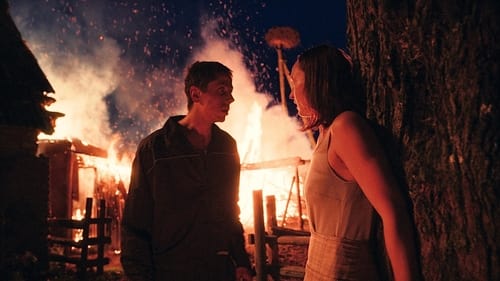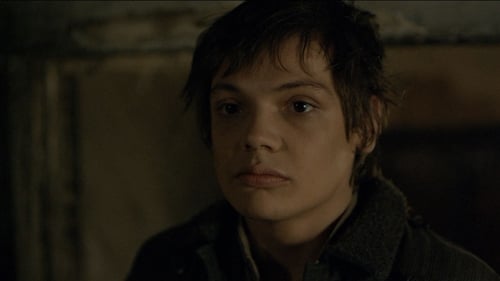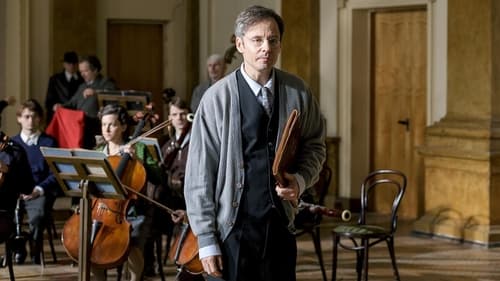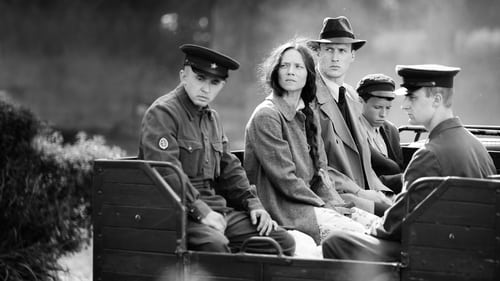
Producer
The film tells the story of an artist avoiding a confrontation with power and the artistic and personal consequences of this choice. A powerful historical drama on the true story of Maria Leiko, famous actress who late in her career has to decide between fame and love for her grandchild, between her ideals or the lies of Stalin’s totalitarian regime.

Producer

Producer
Through six very different families, documentary “The Land” shows the variety of the countryside in the 21st century, the contradictions of countryside living as well as illusions about farmer’s life. There are various reasons why our protagonists chose to live in the homesteads, away from the hustle and bustle of the city. Some were done with spending too much time in an office, traffic and living a virtual life, they wanted real, tangible things. Some have moved to countryside by their own choice, but some by predisposition of their families. But what unites them all - they aspire for the stability provided by their own land and house. Together with our protagonists, we will spend one year’s cycle of farmer’s life, that will start with the spring sowing and finish with the autumn harvest and land preparation for the next year.

Producer
Almost 30 years after the collapse of the Soviet Union we can observe the return of rhetoric of a strong person of the totalitarian era. Could this be facilitated by the remains of totalitarian subservience in our heads and minds? The Director of the film Ivo Briedis and journalist Rita Ruduša, both born in the USSR, are going on a journey to explore the phenomenon of “Homo Sovieticus” and to discover whether a human being of the totalitarian mindset has specific geographical boundaries.

Writer
Almost 30 years after the collapse of the Soviet Union we can observe the return of rhetoric of a strong person of the totalitarian era. Could this be facilitated by the remains of totalitarian subservience in our heads and minds? The Director of the film Ivo Briedis and journalist Rita Ruduša, both born in the USSR, are going on a journey to explore the phenomenon of “Homo Sovieticus” and to discover whether a human being of the totalitarian mindset has specific geographical boundaries.

Producer
Lost in remotest part of Eastern Europe, Sam is a foreigner, searching for his biological father Lagzdins where a minor road accident leads to a chance meeting with a pig-farmer's daughter, who captures him and makes him a forced laborer on the farm.

Producer
It is 1991 in Latvia and nineteen-year-old aspiring cinematographer Jazis’s whole world is thrown into chaos as he is dragged into the people’s peaceful protests against the Soviet Army’s attempted takeover of power in his country.

Producer
Līgatne river ferry crossing takes locals, tourists, passers-by and cars from early spring to the fall over river Gauja. It's the last of what were once many such 'rope ferries' across Gauja, but it remains more than an historical oddity and plays an important part in many lives. At just 12 square meters, the wooden ferry nevertheless encompasses an intriguing and sometimes surprising selection of what constitutes 21st-century Latvia.

Co-Producer
15 August 1990. Viktor Tsoi, the Soviet Union’s most famous rock star, leader of the band Kino, a symbol of freedom and change, dies in an accident on a Latvian highway. The bus driver who was involved in the tragic accident will bring his body back to Leningrad. A party of mourners – Tsoi’s wife and her new boyfriend, his mistress, his producer, his young son and an obsessed photographer – are part of the trip back. This is going to be a long trip, the perfect occasion for an agonizing unravelling of love, jealousy, ambition, and greed.

Producer
Mareks (32) is a young taxi driver in Riga working hard to provide for his son. He is looking forward to spending the weekend with him when an envelope full of cash is stolen from his taxi. With a debt to repay to his short-tempered boss, Mareks needs to earn the money back fast. He drives to the airport and hotels in the hopes of getting some well-paying customers. However, the competition for clients is fierce. Mareks ignores the established rules and upsets the delicate balance between rival taxi companies. As the morning approaches getting the money seems to be the least of Mareks problems.

Co-Producer
Lituânia, 1948. A guerra acabou, mas o país ficou em ruínas. Unté tem 19 anos e é membro do movimento partidário que resiste à ocupação soviética. Eles não combatem de igual para igual, mas essa luta desesperada determinará o futuro de toda a população. Na idade das descobertas da vida, ele se depara com violência e traição. As fronteiras entre a paixão da sua juventude e a causa pela qual está lutando são bastante confusas. Mas Unté vai encarar de frente esse momento, mesmo que isso signifique perder a inocência.

Co-Producer

Writer
Como uma jovem estudante soviética em 1978, Ieva não poderia ter previsto que uma visita de feriado a seu pai, Imants Lesinskis, então trabalhando na missão soviética nas Nações Unidas na cidade de Nova York, iria dividir irreversivelmente sua vida em duas. Envolvida em um jogo de espionagem sombrio, Ieva é forçada a deixar sua antiga vida para trás, para nunca mais ver sua mãe ou sua terra natal, a Letônia. Abrindo a cortina no mundo sombrio dos bastidores da Guerra Fria, este filme conta a história dramática de uma filha de seu pai agente duplo, explorando seu relacionamento contra o pano de fundo de eventos que têm suas raízes há mais de quatro décadas. Para se encontrar e entender o jogo do qual fazia parte, Ieva parte em uma viagem ao passado, confrontando segredos de família, mentiras e traição.

Director
Como uma jovem estudante soviética em 1978, Ieva não poderia ter previsto que uma visita de feriado a seu pai, Imants Lesinskis, então trabalhando na missão soviética nas Nações Unidas na cidade de Nova York, iria dividir irreversivelmente sua vida em duas. Envolvida em um jogo de espionagem sombrio, Ieva é forçada a deixar sua antiga vida para trás, para nunca mais ver sua mãe ou sua terra natal, a Letônia. Abrindo a cortina no mundo sombrio dos bastidores da Guerra Fria, este filme conta a história dramática de uma filha de seu pai agente duplo, explorando seu relacionamento contra o pano de fundo de eventos que têm suas raízes há mais de quatro décadas. Para se encontrar e entender o jogo do qual fazia parte, Ieva parte em uma viagem ao passado, confrontando segredos de família, mentiras e traição.

Producer
Como uma jovem estudante soviética em 1978, Ieva não poderia ter previsto que uma visita de feriado a seu pai, Imants Lesinskis, então trabalhando na missão soviética nas Nações Unidas na cidade de Nova York, iria dividir irreversivelmente sua vida em duas. Envolvida em um jogo de espionagem sombrio, Ieva é forçada a deixar sua antiga vida para trás, para nunca mais ver sua mãe ou sua terra natal, a Letônia. Abrindo a cortina no mundo sombrio dos bastidores da Guerra Fria, este filme conta a história dramática de uma filha de seu pai agente duplo, explorando seu relacionamento contra o pano de fundo de eventos que têm suas raízes há mais de quatro décadas. Para se encontrar e entender o jogo do qual fazia parte, Ieva parte em uma viagem ao passado, confrontando segredos de família, mentiras e traição.

Producer
In the minds of people, Brussels is no longer a geographical location; it is now a myth-surrounded centre, where decisions are made regarding future life in Europe. The most brilliant minds from the European countries have convened in Brussels: former state leaders, highly-placed officials, advisors, translators and interpreters, as well as family members of all these people. Together, they comprise a sort of separate planet ruled by special laws and using new methods of communication; it is a place of a high concentration of power and all sorts of creature comforts. The anxiety following the 2016 attacks on Brussels has taken everyone by surprise, and the question whether to stay on Planet Brussels now comes up increasingly often. The Brexit news gave completely different kind of concussion to the commonly established center of Europe.

Producer
For many years, Saturday market in Skulte has been one of the main events of the week. The roles in the market have been carefully divided among the locals – there’s the pastor of the local parish, the bell-ringer, the pharmacist and the nearby residing sheepman, and it’s been long since it’s not just a customer-vendor relationship among them. Suddenly the owner of the market comes on the scene – he has decided to move it all to a new location, which so far has been known as an accident blackspot.

Producer
The only novel written by Giuseppe Tomasi di Lampedusa, The Leopard (Il Gattopardo, 1958), just like its screen adaptation by Luchino Visconti, is considered a masterpiece. This film tells about the life of Tomasi and his German-Baltic wife Alexandra von Wolff-Stomersee – their unusual love story. The chaos of the Russian Revolution of 1917 and World War II forced Alexandra to leave St. Petersburg and later on – the family's castle in Stāmeriena, Latvia. During the war, in 1943, she fled to her husband in Palermo, where she would live until the day she died.

Director
“Lustrum” was one of the state administration principles of the Roman Empire – a five-year period after which public administrators underwent a purification and repentance process that was usually accompanied by a sacrifice. During this time, the representatives of the previous administration confessed all their sins, repented and genuinely swore allegiance to the new administration. The Cabinet of Ministers of the Republic of Latvia has made a decision to open the KGB archives in May 2018. The film is an endeavour to answer the question of whether the lustration that never took place in the 1990s may turn out to be dangerous for the future existence of statehood.

Producer
Hardly anyone would have predicted that Žanis Lipke would miraculously become a hero. He was a completely ordinary Latvian blue-collar worker. In order to be able to support his family under wartime conditions, he worked at the German military aviation warehouses and supplemented his income by smuggling at night. This film attempts to answer the question whether Žanis’ courage stems from his adventurous and daring spirit, stubbornness, or a sense of responsibility towards people in need.

Producer
Eva – a beautiful, but meek young woman – arrives at an isolated country house where her husband Robert is lying in a coma recovering from injuries sustained in a mysterious accident in which they lost their apartment. Soon strange things start happening around the house and Eva becomes convinced that Robert is not actually unconscious and is out to harm her.

Producer
The To Be Continued documentary follows lives of five children throughout their first school year. Kārlis's family is firmly rooted in the Latvian countryside. Gleb's grandparents came to Latvia only in the Soviet period. Zane's family are first-generation urban-dwellers. Anastasija's family moved from the city to the countryside. Anete's mum lives and works in England. The film explores how these choices made by adults are reflected in a child's thinking.

Co-Producer
August 1942: Amidst the unimaginable suffering inflicted during the blockade of Leningrad by the German Wehrmacht, an orchestra director was given an almost impossible task: to stage the premiere of Dimitri Shostakovitch's "Leningrad Symphony". The performance became a symbol of the brief triumph of culture over the barbarism of war.

Producer
The 14th of June 1941, Soviet-occupied Latvia: Without warning, the authorities break into the house of Melanie and her husband Aleksandr and force them to leave everything behind. Together with more than 15 000 Latvians, Melanie and her son get deported to Siberia. In her fight against cold, famine and cruelty, she only gains new strength through the letters she writes to Aleksandr, full of hope for a free Latvia and a better tomorrow.

Producer
This investigative documentary explores the methods through which Russia influences the domestic policy of the Baltic States – by dividing the local community, promoting nostalgia for the Soviet Union and dismissing the recovered independence of the Baltic States.

Producer
Self-made banker Boriss Osipovs achieves quick success immediately after the collapse of the USSR, but he flees Latvia to avoid arrest for illegal operations. Fifteen years later, his family receives a photograph from Interpol of an elderly gentleman with the same name who resides in a Malaysian mental asylum. Could it be him? Despite the reservations of her family, Osipovs’ daughter, documentary director Ieva Ozoliņa, starts an investigation to find out the truth about the man in the photograph. An emotional story about a man who loses himself in times of change...and the daughter who hopes to find him.

Producer
Seven versions of Riga, the city on the Baltic Sea, and its features as seen by outstanding European film directors: Sergei Loznitsa (The Old Jewish Cemetery), Ivars Seleckis (On Ķīpsala), Audrius Stonys (Riga Boats), Jaak Kilmi (Littering Prohibited!), Jon Bang Karlsen (Cats in Riga), Rainer Komers (Daugava Delta), and Bettina Henkel (Theatre Street 6).

Sir Isiah Berlin
The film is based on true events, it tells the stories of two outstanding personalities of the 20th century – Sergei Eisenstein and Isaiah Berlin, who were both born and spent their childhood in Riga but soon had to leave the city. The film follows the lives of the two characters during the turbulent first half of the 20th century, telling how one of them becomes “the greatest film director of his generation” in the totalitarian Soviet Union, and the other “the greatest thinker of his generation” in liberal Great Britain.

Producer
The film is based on true events, it tells the stories of two outstanding personalities of the 20th century – Sergei Eisenstein and Isaiah Berlin, who were both born and spent their childhood in Riga but soon had to leave the city. The film follows the lives of the two characters during the turbulent first half of the 20th century, telling how one of them becomes “the greatest film director of his generation” in the totalitarian Soviet Union, and the other “the greatest thinker of his generation” in liberal Great Britain.

Writer
A film about one of Europe's best young theatre directors, Latvian-born Alvis Hermanis, and his distinctive method, marked by a renunciation of classic dramatic material.

Director
A film about one of Europe's best young theatre directors, Latvian-born Alvis Hermanis, and his distinctive method, marked by a renunciation of classic dramatic material.

Producer
The story of the German occupation of Latvia and one of Rīga’s major 20th century historical tragedies, which will be remembered by the people of Rīga forever. French teacher Riva Šefere, lawyer Aleksandrs Bergmanis, music teacher Gabriela Paraša, film historian Valentīna Freimane and historian and founder of the museum “Jews in Latvia” Marģers Vetermanis are just a few of the 30 000 Latvian Jews who were imprisoned in the Riga ghetto. These are eyewitness memories of the holocaust that need to be told.

Producer
Composers are regular people – they drive public transport, do sports, pay their bills. And still – they are very different as they are able to comprehend sound. The documentary film Sounds Under the Sun is an inspiring cinematic journey all over the world to meet some of the world-famous contemporary classical music composers. Visiting Alaskan forests, skyscrapers in Tokyo, and war zone in Georgia, the film gives a glimpse of how the composers share their struggle to create music from the moment of sonic creation till the moment when their music is interpreted for public (the film features composers Sir John Tavener from the UK, Leonid Desyatnikov from Russia, Giya Kancheli from Georgia, Dobrinka Tabakova from Bulgaria, John Luther Adams from the USA, and Ko Matsushita from Japan, and one of the world’s best youth choirs, Kamēr..., from Latvia).

Writer
Composers are regular people – they drive public transport, do sports, pay their bills. And still – they are very different as they are able to comprehend sound. The documentary film Sounds Under the Sun is an inspiring cinematic journey all over the world to meet some of the world-famous contemporary classical music composers. Visiting Alaskan forests, skyscrapers in Tokyo, and war zone in Georgia, the film gives a glimpse of how the composers share their struggle to create music from the moment of sonic creation till the moment when their music is interpreted for public (the film features composers Sir John Tavener from the UK, Leonid Desyatnikov from Russia, Giya Kancheli from Georgia, Dobrinka Tabakova from Bulgaria, John Luther Adams from the USA, and Ko Matsushita from Japan, and one of the world’s best youth choirs, Kamēr..., from Latvia).

Director
Composers are regular people – they drive public transport, do sports, pay their bills. And still – they are very different as they are able to comprehend sound. The documentary film Sounds Under the Sun is an inspiring cinematic journey all over the world to meet some of the world-famous contemporary classical music composers. Visiting Alaskan forests, skyscrapers in Tokyo, and war zone in Georgia, the film gives a glimpse of how the composers share their struggle to create music from the moment of sonic creation till the moment when their music is interpreted for public (the film features composers Sir John Tavener from the UK, Leonid Desyatnikov from Russia, Giya Kancheli from Georgia, Dobrinka Tabakova from Bulgaria, John Luther Adams from the USA, and Ko Matsushita from Japan, and one of the world’s best youth choirs, Kamēr..., from Latvia).

Writer
Since Latvia regained independence in 1991, only a small number of all those who emigrated during the 1940s returned, though many of them had been waiting for the occupation to end. This is about the first generation of Latvian émigrés - those who came back, and those who chose to stay in the West.

Director
Since Latvia regained independence in 1991, only a small number of all those who emigrated during the 1940s returned, though many of them had been waiting for the occupation to end. This is about the first generation of Latvian émigrés - those who came back, and those who chose to stay in the West.

Writer

Director


































